| Lesson 3 | Common acronyms |
| Objective | Explore CORBA associated acronyms |
Common Corba Acronyms
Begin to explore CORBA by learning more about some of the associated acronyms.
Most technologies come with their own set of acronyms and CORBA is no exception. Chances are, if you have been looking into CORBA, you have already run into some of the acronyms that we are about to see. The most important thing to focus on at this point is getting familiar with the acronyms and getting some idea of what they do. As we learn are about CORBA, we will explore these topics in greater depth.
Most technologies come with their own set of acronyms and CORBA is no exception. Chances are, if you have been looking into CORBA, you have already run into some of the acronyms that we are about to see. The most important thing to focus on at this point is getting familiar with the acronyms and getting some idea of what they do. As we learn are about CORBA, we will explore these topics in greater depth.
CORBA Common Acronyms
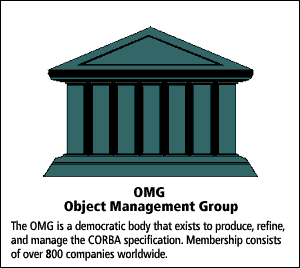
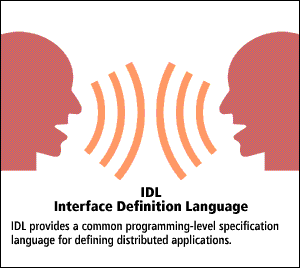
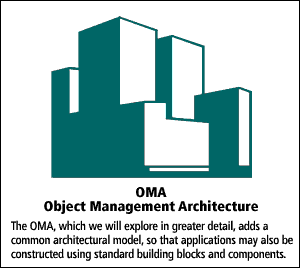
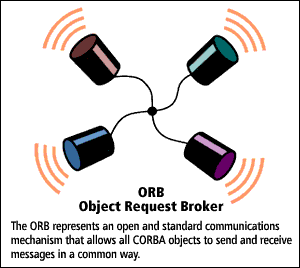
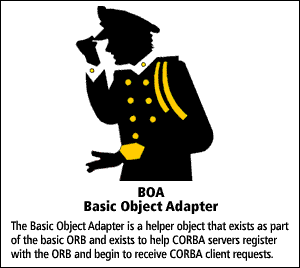
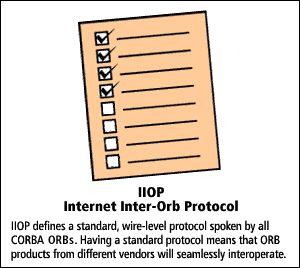
Distributed Software Systems and CORBA 2.0
Now that we have a good idea of the basic reason for CORBA's existence (a tool for building distributed software systems)
and have been introduced to some of CORBA's acronyms, we will begin to learn more about the details of what makes CORBA tick.
The following lessons will take us from our current conceptual understanding of distributed clients and servers and build on our understanding to explore CORBA in detail. CORBA 2.0 also removed another major obstacle by providing the Internet Inter-ORB Protocol (IIOP). IIOP guarantees that system components developed for different vendors' ORBs can interoperate with one another, whereas before CORBA 2.0, different system components could communicate only if all of them used the same vendor's ORB. The C++ mapping and IIOP were key features that initiated CORBA's move into the mainstream and made it a viable technology for many commercial companies. This increased popularity of CORBA also meant an increased demand for extensions and bug fixes. As a result, the specification has been revised three times since the publication of CORBA 2.0. CORBA 2.1 was largely a cleanup release that addressed a number of defects. CORBA 2.2 added one major new feature: the Portable Object Adapter (POA). The POA, together with an update to the C++ mapping, removed the server-side portability problems that existed to that point. CORBA 2.3, the most recent release, as of this writing, fixed many minor bugs and added one major new feature, Objects-By-Value.
The OMG has now grown to more than 800 members, making it the world's largest industry consortium, and CORBA has become the world's most popular and widely used middleware platform. In our estimation, C++ is the dominant implementation language for CORBA (although Java is making some inroads for client development). Demand for CORBA-literate C++ programmers continuously outstrips supply, and it seems likely that CORBA will remain the dominant middleware technology for at least several more years. This book is all about making you CORBA-literate and giving you the information you need to be able to write production-quality CORBA-based systems.
The following lessons will take us from our current conceptual understanding of distributed clients and servers and build on our understanding to explore CORBA in detail. CORBA 2.0 also removed another major obstacle by providing the Internet Inter-ORB Protocol (IIOP). IIOP guarantees that system components developed for different vendors' ORBs can interoperate with one another, whereas before CORBA 2.0, different system components could communicate only if all of them used the same vendor's ORB. The C++ mapping and IIOP were key features that initiated CORBA's move into the mainstream and made it a viable technology for many commercial companies. This increased popularity of CORBA also meant an increased demand for extensions and bug fixes. As a result, the specification has been revised three times since the publication of CORBA 2.0. CORBA 2.1 was largely a cleanup release that addressed a number of defects. CORBA 2.2 added one major new feature: the Portable Object Adapter (POA). The POA, together with an update to the C++ mapping, removed the server-side portability problems that existed to that point. CORBA 2.3, the most recent release, as of this writing, fixed many minor bugs and added one major new feature, Objects-By-Value.
The OMG has now grown to more than 800 members, making it the world's largest industry consortium, and CORBA has become the world's most popular and widely used middleware platform. In our estimation, C++ is the dominant implementation language for CORBA (although Java is making some inroads for client development). Demand for CORBA-literate C++ programmers continuously outstrips supply, and it seems likely that CORBA will remain the dominant middleware technology for at least several more years. This book is all about making you CORBA-literate and giving you the information you need to be able to write production-quality CORBA-based systems.